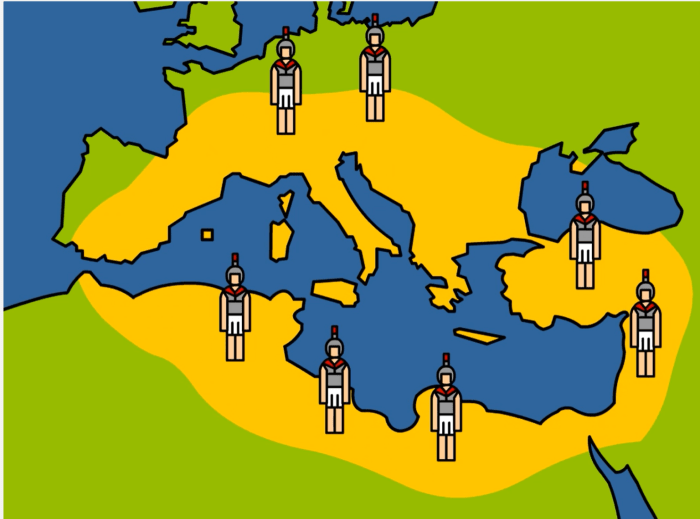Fall of the roman empire brainpop – Embark on an enlightening journey through history with BrainPOP’s “Fall of the Roman Empire.” This captivating exploration delves into the rise, decline, and enduring legacy of one of the most influential civilizations in human history.
From its humble beginnings to its sprawling territorial expansion, the Roman Empire stands as a testament to the complexities of human civilization. This introductory paragraph sets the stage for a comprehensive analysis of the factors that led to the empire’s eventual demise.
Overview of the Roman Empire
The Roman Empire was one of the most powerful and influential empires in history. It began as a small city-state in central Italy in the 8th century BC and grew to control a vast territory that stretched from the Atlantic Ocean to the Persian Gulf.
The Roman Empire was a complex and sophisticated civilization. It developed a system of laws, a system of government, and a system of roads and aqueducts that were unmatched in the ancient world.
The Roman Empire was also a major center of culture and learning. It produced some of the greatest writers, artists, and thinkers of the ancient world.
Key Factors that Contributed to the Success of the Roman Empire, Fall of the roman empire brainpop
- A strong military
- A stable government
- A prosperous economy
- A well-developed infrastructure
- A strong sense of civic duty
Causes of the Fall of the Roman Empire
The Roman Empire began to decline in the 3rd century AD. There were a number of factors that contributed to its fall, including:
Political and Economic Factors
- Political instability
- Economic decline
- Inflation
- High taxes
Military and Social Factors
- A decline in the quality of the Roman army
- The rise of barbarian invasions
- A decline in the birth rate
- A loss of civic virtue
Specific Events or Actions that Contributed to the Fall of the Roman Empire
- The assassination of Julius Caesar in 44 BC
- The Battle of Adrianople in 378 AD
- The sack of Rome by the Visigoths in 410 AD
Consequences of the Fall of the Roman Empire: Fall Of The Roman Empire Brainpop
The fall of the Roman Empire had a profound impact on the world. It led to the end of the Pax Romana, a period of peace and prosperity that had lasted for over 200 years.
The fall of the Roman Empire also led to the rise of new empires, such as the Byzantine Empire and the Holy Roman Empire.
Short-Term Consequences of the Fall of the Roman Empire
- Political instability
- Economic decline
- Social upheaval
Long-Term Consequences of the Fall of the Roman Empire
- The end of the Pax Romana
- The rise of new empires
- The development of new political and economic systems
Comparison of the Roman Empire to Other Civilizations

The Roman Empire was one of the most powerful and influential empires in history. It can be compared to other ancient civilizations, such as the Greek Empire or the Chinese Empire.
The Roman Empire was similar to other ancient civilizations in that it had a strong military, a stable government, and a prosperous economy.
However, the Roman Empire was also unique in a number of ways. For example, it developed a system of laws that was unmatched in the ancient world.
Similarities and Differences between the Roman Empire and Other Ancient Civilizations
| Characteristic | Roman Empire | Greek Empire | Chinese Empire |
|---|---|---|---|
| Military | Strong | Strong | Strong |
| Government | Stable | Stable | Stable |
| Economy | Prosperous | Prosperous | Prosperous |
| Laws | Well-developed | Well-developed | Less developed |
Legacy of the Roman Empire

The Roman Empire left a lasting legacy on the world. Its laws, its government, and its infrastructure are still used today.
The Roman Empire also had a major impact on the development of Christianity.
Political, Economic, and Cultural Impact of the Roman Empire
- The development of Roman law
- The development of the Roman government
- The development of Roman infrastructure
- The spread of Christianity
Popular Questions
When did the Roman Empire fall?
The Western Roman Empire officially fell in 476 AD, while the Eastern Roman Empire (Byzantine Empire) continued until 1453 AD.
What were the main causes of the fall of the Roman Empire?
Political instability, economic decline, military weakness, and social unrest all contributed to the empire’s downfall.
What was the impact of the fall of the Roman Empire?
The fall of the Roman Empire led to the fragmentation of Europe, the rise of new civilizations, and the preservation of classical knowledge.
